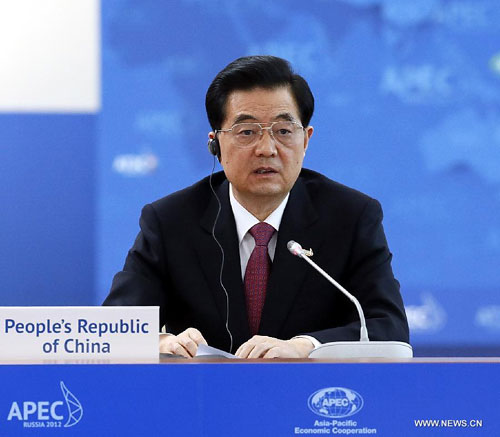APEC Summit highlights regional development
 0 Comment(s)
0 Comment(s) Print
Print E-mail CRI, September 9, 2012
E-mail CRI, September 9, 2012
|
|
|
Chinese President Hu Jintao speaks at the 20th APEC Economic Leaders' Meeting in Vladivostok, east Russia, Sept. 8, 2012. [Photo: Xinhua] |
Leaders of the Asia-Pacific Economic Cooperation, or APEC, member economies have gathered in Vladivostok, Russia to discuss regional development amid the slow recovery of the world economy.
As one of the most influential economic bodies in the region, China has pledged to ensure steady and robust growth to help stabilize the world economy.
The summit, on the theme of "Integrate to Grow, Innovate to Prosper", is expected to focus on trade and investment liberalization, regional economic integration, food security, supply chains and cooperation to foster innovative growth.
Chinese president Hu Jintao has drawn attention to a downward pressure on the Chinese economy under the global economic slowdown. He said China would strive to boost domestic demand and rebalance the economy to tackle these challenges.
"China will continue to stick to proactive fiscal policies and steady currency policies, keep up the continuity and stability of our macro-economics policies, strengthen pertinence, flexibility, and far-sightedness of our macro tuning. What is more, China will endeavor to create a transparent legal environment, a fair market and stable business operation environment to facilitate foreign direct investment. China will strengthen economic links with trading partners and deepen cooperation with emerging economies in the Asia-Pacific region."
Hu Jintao also announced that China would host the APEC Summit and related meetings in 2014.
Mexican President Felipe Calderon has echoed Hu Jintao's suggestion, stressing the urgency of further trade to speed up the global economic recovery.
"What the world needs today to overcome this crisis is more trade, not less. Therefore we extended our commitment until 2014. It would be very important for APEC economies to send a strong message in favor of trade at this summit. Secondly, it is important to support the process of strengthening financial regulation and supervision as well as financial stability. Well allocated credit is a very powerful instrument for development. These are the lessons that Latin American and Asian countries have painfully learned during our crisis."
US Secretary of State Hilary Rodham Clinton has denounced trade protectionism and advocated free trade by urging the private sector to push governments to make reforms and drive the economy.
"The United States is making a major investment in the Asia-Pacific, and we are doing everything we can to promote that open, free, transparent, and fair economic system. The private sector needs to stand up for the system that will allow you to thrive over the long run. That means pushing governments to support high-standard trade agreements like the Trans-Pacific Partnership, to drop harmful protectionist policies. It means playing by the rules, respecting workers and opening doors to qualified women."
Meanwhile, Indonesia's President Susilo Bambang Yudhoyono has called for developing an economic early warning system in the region to avoid bearing the brunt of any future crisis.
And according to Zhang Lijun, Chairman of China APEC Development Council, Russia wants to grasp the opportunity to host the APEC to deepen its strategic partnerships with significant member countries, improve domestic investment environment to attract more investors and establish free trade zones in the Asia-Pacific region.
The APEC region, composed of 21 Pacific member economies, accounts for about 40 percent of the world's population, around 57 percent of world's GDP and 48 percent of global trade.






